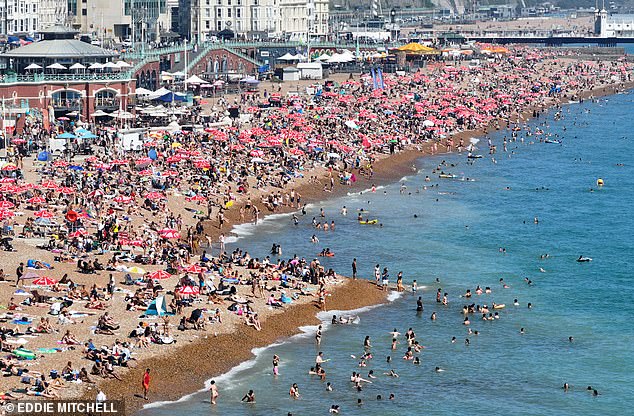
UK Heatwave Deaths Could Hit 34,000 Annually by 2070 — 50 Times Prior Estimates
Rising Heat Deaths in UK Linked to Climate Change, Study Warns
Climate change could cause heat-related deaths in England and Wales to surge fiftyfold by 2070, according to a new study. Researchers predict up to 34,000 annual fatalities under worst-case scenarios, compared to today’s baseline of 634. Even optimistic projections estimate a sixfold increase, highlighting the urgent need for adaptation.

Brighton beach crowds during a June 2025 heatwave. Rising temperatures could make extreme heat the "new normal."
Key Findings
The study, published in PLOS Climate, analyzed 50-year projections across 15 scenarios, combining climate trends, aging populations, and regional factors. Key results include:
- Worst-case scenario (4.3°C warming, minimal adaptation): 34,000 annual heat deaths by 2070.
- Best-case scenario (1.6°C warming, strong adaptation): 4,592 annual deaths by 2070.
- Regional disparities: Southern England faces higher risks than the North.
The aging population exacerbates vulnerabilities, with those over 65 most at risk. Previous studies underestimated mortality by not accounting for demographic shifts.
2022: A Glimpse of the Future
The 2022 UK heatwave, which saw temperatures breach 40°C for the first time, caused nearly 3,000 excess deaths. Researchers warn such events could become routine by 2050. The World Meteorological Organization confirmed 2024 as the hottest year on record (1.55°C above pre-industrial levels), with similar trends expected through 2028.

London during a June 2025 heatwave. The Met Office links extreme heat directly to climate change.
Adaptation Critical to Survival
"Rising temperatures alone aren’t the only threat—how we adapt our cities and support vulnerable communities matters deeply," said lead author Dr. Rebecca Cole. Effective measures include:
- Passive cooling: Green roofs, better ventilation.
- Active cooling: Air conditioning access.
- Community action: Shaded public spaces, healthcare outreach.
However, overreliance on air conditioning risks increasing energy demands, underscoring the need for sustainable solutions.
Heat’s Deadly Threshold
Temperatures above 28°C (82.4°F) pose serious health risks, especially for the elderly. The UK’s June 2025 heatwaves saw thermometers hit 35°C, a trend scientists tie directly to greenhouse gas emissions.

Heat domes, intensified by climate change, drive record-breaking temperatures in Europe.
A Warmer Future
The Met Office warns that 40°C summers—once a 1-in-2,500-year event—could occur every 15 years by 2100. "Heatwaves are now hotter and more frequent," said climate scientist Dr. Amy Doherty. "By 2050, temperatures over southeast England could rise by 3°C."
Call to Action
Senior study author Dr. Clare Heaviside urged immediate steps: "Reducing emissions and investing in adaptation can save lives—but delays will cost us." The study underscores that societal choices today will determine whether the UK faces thousands or tens of thousands of heat-related deaths in decades to come.

Heatwaves pose severe risks for older adults. Adaptation efforts must prioritize vulnerable groups.
As temperatures climb, the study serves as a stark reminder: without swift action, the UK’s climate future could be deadly.


